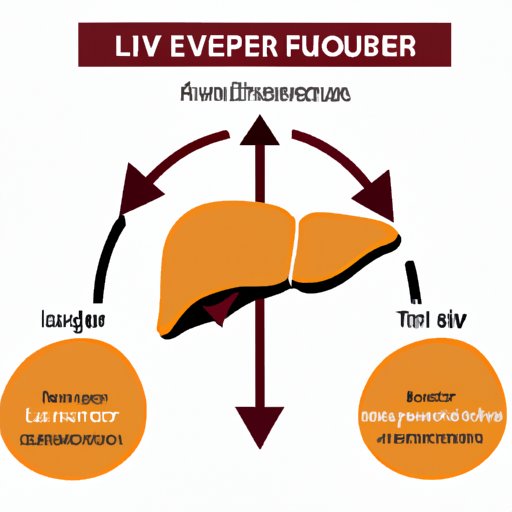
Introduction
The liver is one of the most important organs in the human body, responsible for filtering toxins from the blood and helping with digestion. When the liver fails, the consequences can be severe, leading to a range of symptoms and potentially life-threatening complications. In this article, we’ll explore how long you can live with liver failure, the factors that impact life expectancy, and the latest treatment options and research developments that offer hope for patients and their families.
Types of Liver Failure and their Impact on Life Expectancy
There are two main types of liver failure: acute and chronic. Acute liver failure can occur suddenly, often as a result of an overdose of medication or exposure to toxic chemicals. Chronic liver failure typically develops over time, as a result of ongoing liver damage caused by conditions such as hepatitis, alcoholism, or non-alcoholic fatty liver disease.
The impact of liver failure on life expectancy can vary depending on a range of factors, including age, overall health, and the severity of the liver disease. In general, however, individuals with acute liver failure may have a lower life expectancy than those with chronic liver failure, due to the sudden and severe nature of the condition.
Factors Affecting Life Expectancy
Age is one of the most important factors affecting life expectancy in liver failure patients. Older individuals are often more susceptible to complications such as infections, and may have a harder time recovering from treatment. Overall health is also an important factor to consider, as patients with other chronic conditions such as diabetes or heart disease may have a lower life expectancy than those without underlying health issues. Finally, the severity of the liver disease itself can impact life expectancy, with end-stage liver failure typically offering a bleaker prognosis than compensated liver failure.
Symptoms and Stages of Liver Failure
Early symptoms of liver failure can include fatigue, nausea, and loss of appetite. As the disease progresses, patients may experience jaundice (yellowing of the skin and eyes), abdominal swelling, confusion, and even coma in severe cases.
There are three stages of liver failure: compensated, decompensated, and end-stage. In compensated liver failure, the liver is still able to function to some degree, and patients may experience few symptoms. In decompensated liver failure, the liver begins to fail more seriously, leading to symptoms such as jaundice and abdominal swelling. In end-stage liver failure, the liver is completely unable to function, and patients may experience life-threatening symptoms such as bleeding, infection, and organ failure.
Treatment Options for Liver Failure
There are a range of treatment options available for liver failure patients, depending on the severity of their disease and the underlying cause. Medications can help manage symptoms and slow the progression of liver damage, while surgeries such as liver transplant may be necessary for end-stage liver failure patients. Lifestyle changes such as stopping alcohol consumption and losing weight can also be beneficial for some patients. The key is to manage symptoms carefully and prevent complications such as infection and bleeding.
Managing Symptoms and Preventing Complications
It’s important for liver failure patients to work closely with their healthcare provider to manage their symptoms and prevent complications. This may involve taking medications such as diuretics or lactulose to manage fluid buildup and reduce the risk of encephalopathy, a neurological condition that can occur in liver failure patients. Additionally, patients may need to receive regular vaccinations for diseases such as hepatitis A and B to reduce the risk of complications.
Coping Strategies for Patients and Caregivers
Liver failure can have a significant emotional impact on patients and their families, and it’s important to have strategies in place for managing stress, anxiety, and depression. Building a support system of friends, family members, and healthcare professionals can be beneficial, as can accessing financial and emotional support resources such as counseling services and support groups.
Accessing Resources for Financial and Emotional Support
There are a range of resources available for liver failure patients and their families who need financial and emotional assistance. Many healthcare providers offer counseling services and support groups for patients and caregivers, while organizations such as the American Liver Foundation and the National Institute of Diabetes and Digestive and Kidney Diseases offer additional resources such as financial assistance programs and educational materials.
Practical Tips for Managing Life with Liver Failure
Patients with liver failure may need to make lifestyle changes to help manage their symptoms and improve their overall health. This can include following a healthy diet and exercise regimen, staying active and engaged in life, and finding ways to reduce stress and promote mental wellness.
Accessing Support Groups and Online Resources
Online resources such as social media groups and message boards can be a valuable source of support for liver failure patients and their families. It’s important to be cautious when accessing health information online, however, and to always consult with a healthcare professional before making any major changes to your treatment plan or lifestyle.
Latest Research and Developments in Liver Failure
There is ongoing research into new treatments and therapies for liver failure patients, including cell-based therapies and gene editing techniques. Additionally, clinical trials are underway to test new medications and surgical techniques for managing liver failure and improving quality of life for patients.
Hope for the Future of Liver Failure Treatment and Management
While liver failure can be a challenging and potentially life-threatening condition, there is hope for patients and their families. Advances in medical research and technology, combined with a focus on symptom management and emotional support, can help improve the overall quality of life for patients living with liver failure.
Conclusion
Liver failure can be a complex and challenging condition, but with the right support and treatment, patients and their families can manage the disease and improve their overall quality of life. By working closely with healthcare providers, accessing support resources, and making healthy lifestyle choices, liver failure patients can live longer, healthier lives.




